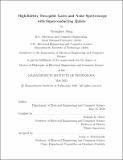High-fidelity Two-qubit Gates and Noise Spectroscopy with Superconducting Qubits
Author(s)
Sung, Youngkyu
DownloadThesis PDF (33.48Mb)
Advisor
Oliver, William D.
Terms of use
Metadata
Show full item recordAbstract
Although there has been tremendous progress toward achieving low error rates with superconducting qubits, error-prone gates remain the bottleneck in realizing quantum computing applications. To build robust quantum computers, it is crucial to identify the dominant sources of errors and suppress them by engineering the control and architecture of qubit systems. In this thesis, we implement a tunable coupler and noise spectroscopy with the goal of achieving high-fidelity two-qubit gates and characterizing underlying noise mechanisms in superconducting qubits, respectively. We engineer various control techniques---including a fast adiabatic control and spin-locking noise spectroscopy---by incorporating the impact of higher energy levels of a qubit and coupler. Specifically, we harness the higher levels of a coupler as a resource to cancel out an unwanted ZZ interaction between qubits, and thereby improving the two-qubit gate fidelity. In addition, we exploit the multiple level transitions of a transmon sensor to distinguish the noise contributions from flux and photon shot noise. The control protocols developed in this thesis may help resolve hardware challenges in building quantum computers with low error rates.
Date issued
2022-05Department
Massachusetts Institute of Technology. Department of Electrical Engineering and Computer SciencePublisher
Massachusetts Institute of Technology